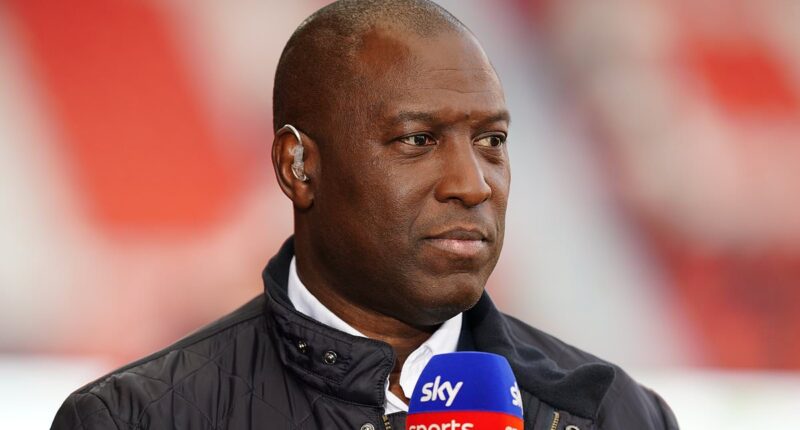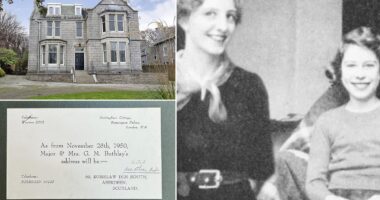The late Kevin Campbell’s son shared how the former Arsenal and Everton striker appeared unrecognizable to him as he discussed his father’s health deterioration before his passing at 54 years old in the previous year.
Manchester area coroner Zak Goldberg heard during an inquest that Campbell had lost 10 stone in weight between January and May last year.
Campbell, who weighed 19 stone when first admitted in January last year, drop to barely nine stone when re-admitted four months later.
The dramatic weight loss had been caused by a rare heart infection endocarditis, an infection in the inner lining of the heart or its valves.
Following an investigation, Manchester Royal Infirmary (MRI) acknowledged that they should have identified the issue sooner, though the coroner concluded that the hospital had done all within its power to try to save him.
Campbell suffered two strokes and was suffering from severe heart and kidney problems in the months before he died.

In a heartbreaking account, Kevin Campbell’s children recounted the decline of their father’s health before his passing. The iconic football figure had reportedly shed more than half of his body weight due to an unusual heart infection.

Campbell’s son, Tyrese, gave a heartbreaking account of his father’s health deterioration

Tyrese Campbell, who plays for Sheffield United, gave a glowing tribute about his father
Campbell’s two sons Tyrese and Kyle, who are both footballers themselves, have spoken about their father’s decline last year.
Kyle, who plays as a striker for Bootle FC, revealed his father ‘didn’t look like him’ due to the weight loss.
‘It’s hard on the mind as well when you see someone so fit, so powerful, so loving, and you’re looking at him like ‘that’s not him”,’ he told the BBC.
‘We never really lied to each other, never said “he’s going to come back perfect”, because sometimes in life, it doesn’t go your way.’
Tyrese, who plays as a striker for Sheffield United, admitted the family had prepared themselves for Campbell’s death and admitted to being ‘relieved’ that their father would not be in pain anymore.
‘Without saying it to each other, we knew it was coming, I’d say we prepared,’ said Tyrese.
‘We’re our Dad’s kids, so we’ve got his strength. We were relieved eventually when the day did come – he wasn’t in pain any more and we were at peace with that. I knew he wouldn’t have wanted to be that way and he could just rest.’
Tyrese, 25, added that his father was a ‘respectful, happy and positive person’ in a glowing tribute.

His final blood test, when it was decided no more could be done to save his life, found a previously undiagnosed infection of the heart valve

Campbell became a cult hero on Merseyside during a six-year stay at Everton from 1999-2005
‘I think if you ask anyone who’s ever been in the presence of him, they’ll always remember him and speak about how good a person he was,’ Tyrese added.
He carried the whole room – you knew when he was in there because you could probably hear him.
‘He was a respectful, happy, positive person. You could even say almost too good for this Earth. A proper angel sent from heaven.’
Campbell’s sons were speaking following the conclusion of an inquest on Monday, which examined the handling of his illness by Manchester Royal Infirmary.
The hospital’s consultant physician Professor Peter Shelby told the inquest: ‘Why was it that a man who a few months before was a picture of health had so suddenly deteriorated? There should have been a little more curiosity.’
A final blood test carried out on him, after medics had decided there was nothing more they could do to save his life, found a previously undiagnosed infection of the heart valve, endocarditis. But the coroner ruled that spotting it earlier would not have saved his life. The condition required open heart surgery that Campbell would, in any case, have been too ill to survive.
The first signs that Campbell had grave medical problems came in the January, by which time he had suffered a stroke, caused by a blood clot on his heart. This was causing his kidneys to fail and liver damage. Medics investigated whether some kind of viral infection might have caused this, perhaps picked up on the ex-player’s recent holiday in Papua New Guinea, though that proved not to be the case.
‘When Mr Campbell came in, he was already desperately unwell,’ MRI consultant pathologist Dr Robert Henney told the inquest. ‘Many people would not have survived to point he did. His physical fitness allowed him to get that ill before being admitted.’

Everton and Arsenal supporters paid tribute to Campbell when the clubs met earlier this month

A minute’s applause was held in honour of Campbell in the ninth minute at Goodison Park on April 5
He was taken to intensive care but after dialysis treatment his condition improved, and he was discharged in early March. ‘He told the physios that he was managing ok and looking after himself in the ward,’ Dr Henney said.
Though medics had expected Campbell to continue his recovery after discharge, it was after visiting a cardiology clinic, in a wheelchair, that his health deteriorated again – a result of the heart valve infection, it later turned out – and he was readmitted to the hospital.
He was receiving palliative care and subject to a ‘do not resuscitate’ order there when he came under Dr Henney’s care. Dr Henney consulted with the hospital’s medical director and called together medics to discuss whether there was not something they might yet still do.
In part, there was an awareness that Campbell was ‘a well-known figure’ and that there would be scrutiny if he died, the medic said. ‘It wasn’t because Kevin was a celebrity that I needed to do the blood test.’ he added.
‘This was a man who had been a fit and well 53-year-old and was now dying. I needed absolute clarity about what was happening.’
Though the blood tests confirmed a hopeless position, Campbell did not return to palliative care, receiving medication until he died a few days later. After his death, aged 54, the hospital triggered a level 5 ‘critical incident’ investigation, reserved for cases where failure might have caused a death.
But the hospital’s inquiries later saw that downgraded to level 2, reflecting its views that no harm was done to Campbell by any oversight.

He spent seven years on the books at Arsenal, having graduated from the academy in 1988
Campbell had been a Merseyside legend for his heroics at Everton during his playing career, having spent six years at Goodison Park from 1999-2005.
There, he scored 50 goals in 160 appearances for Everton, with many of his efforts helping to ensure that the club staved off the threat of relegation at the beginning of the millennium.
His early heroics for the Toffees came under the management of Walter Smith, who initially brought the striker in on loan.
The forward also enjoyed success with his boyhood club Arsenal, where he won the FA Cup and League Cup while making more than 200 appearance for the Gunners.
Campbell was also part of the Gunners teams that clinched a First Division title and the European Cup Winners’ Cup.
He spent seven years on the books in north London before departing for Nottingham Forest in 1995.
In all, Campbell scored 107 goals in 394 English top-flight appearances, and also turned out for Nottingham Forest, West Brom, Cardiff City, Leyton Orient and Leicester City.

















